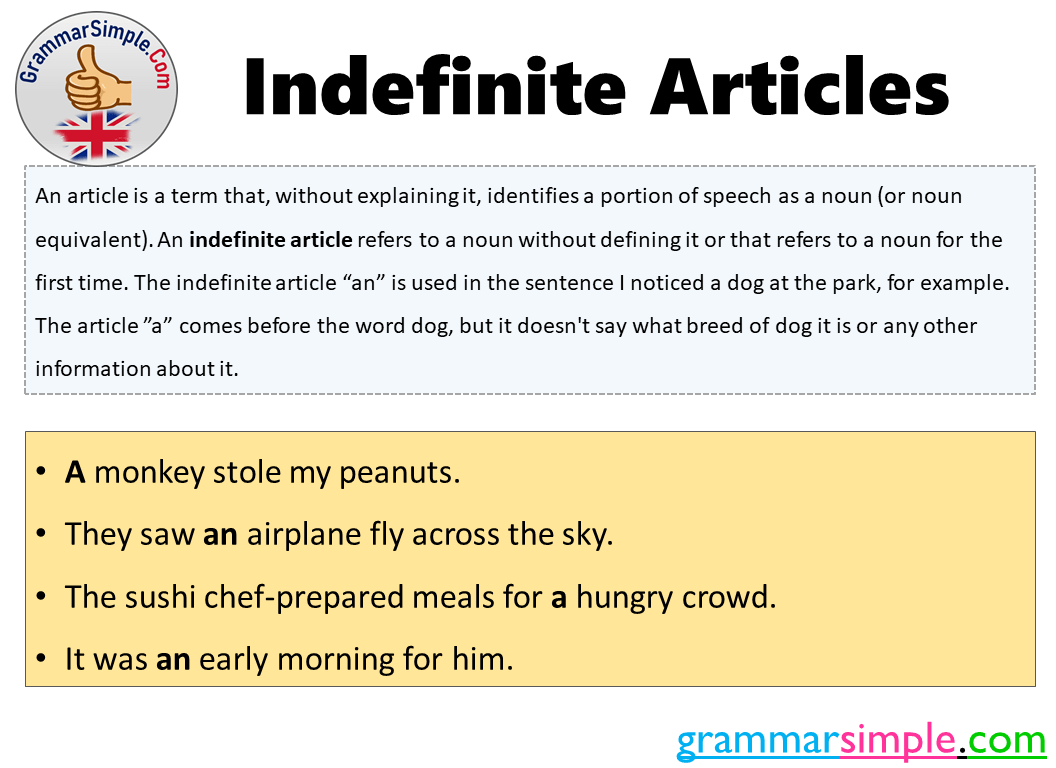Definite and Indefinite Articles, Definition and Examples Sentences


Definite and Indefinite Articles, Definition and Examples Sentences
Table of Contents
Articles
“Articles”, which helps us to define a noun as definite or indefinite in English, is one of the first things that people who start to learn this language should learn. It can be easily understood how simple it is if learned correctly. But even those who know advanced English can make mistakes in this grammar. Let’s start learning now.
A/An usage
“a” and “an” are known as “articles” that come before nouns and serve to indicate that these nouns are one of all other similar entities. As an example, these “articles” are used when talking about any apple you pick from your fridge by choosing just one without any discrimination.
If the names begin with a consonant letter; “a” is placed right before the noun, and if the name starts with a vowel, “an” is brought before the noun. There are two things we should pay attention to here. First, “a” and “an” can never be used alone before an adverb or adjective; must be complete. Secondly, since “a” and “an” mean “any” in the sentence, the nouns mentioned must be singular.
Examples:
- a banana
- a cup
- a notebook
- a pencil
- a lion
- a university
We gave examples of the use of “a” above. We need to mention an exception for the “a university” example, which is in the last place among these examples. Even if the word “university” starts with a vowel, it is “a” instead of “an” because we start with a consonant when pronouncing it. The opposite of this situation can also happen. When we look at the examples given below for the use of “an”, the example of “an hour” is the opposite of the exceptional situation we just mentioned. When pronouncing the word “hour”, the letter “h” falls. Since our pronunciation begins with a vowel, it is preceded by “an”, not “a”. Here we understand that the use of “a” and “an” should be used depending on the pronunciation of the word that follows it, not the spelling.
- an apple
- moment officer
- an hour
- an actor
- an engineer
“A” and “an”, which are never used with plural nouns, also cannot be used with uncountable nouns. For example, the words water or milk are uncountable entities. Expressions such as “a water”, “a milk” cannot be used because they cannot be counted.
INDEFINITE ARTICLE
What is an indefinite article?
An article is a term that, without explaining it, identifies a portion of speech as a noun (or noun equivalent). An indefinite article refers to a noun without defining it or that refers to a noun for the first time. The indefinite article “an” is used in the sentence I noticed a dog at the park, for example. The article ”a” comes before the word dog, but it doesn’t say what breed of dog it is or any other information about it.
There are two indefinite articles in English: “a” and “an”. A word that begins with a consonant is preceded by the letter a, whereas a word that begins with an “a” vowel is preceded by the letter “an”. Consider the following scenario:
- Her sister found a penny on the ground. (P is a consonant.)
- Her brother ate an apple. (A is a vowel.)
Articles, such as “a” and “an”, function similarly to adjectives in that they only alter nouns or noun-like words and phrases. Other modifiers, such as adjectives or adverbs, are usually placed after articles. Consider the following scenario:
- Incorrect: She dressed up as really spooky a ghost for Halloween.
- Correct: She dressed up as a really spooky ghost for Halloween.
It’s vital to note that whether you use “a” or “an” depends on the word that comes after the article, which may or may not be the noun it modifies. Consider the following scenario:
- Kydae is a
- Kydae is an energetic girl.
Indefinite articles in a sentence
The following phrases demonstrate how “a” and “an” are used. You’ll note that the word that comes right after it determines which article we use.
- A monkey stole my peanuts.
- They saw an airplane fly across the sky.
- The sushi chef-prepared meals for a hungry crowd.
- It was an early morning for him.
Recent Posts
Use Rose in a Sentence, How to Use Rose with Example Sentences
Use Rose in a Sentence, How to Use Rose with Example Sentences
Use Yourself in a Sentence, How to Use Yourself with Example Sentences
Use Yourself in a Sentence, How to Use Yourself with Example Sentences
Use Picture in a Sentence, How to Use Picture with Example Sentences
Use Picture in a Sentence, How to Use Picture with Example Sentences
Use Claim in a Sentence, How to Use Claim with Example Sentences
Use Claim in a Sentence, How to Use Claim with Example Sentences
Use Treasure in a Sentence, How to Use Treasure with Example Sentences
Use Treasure in a Sentence, How to Use Treasure with Example Sentences
Use Raise in a Sentence, How to Use Raise with Example Sentences
Use Raise in a Sentence, How to Use Raise with Example Sentences